Love on Display
Every time Phil Prince lays eyes on his new wife Teresa Menendez, he can’t believe his luck. Why this intoxicating woman from Puerto Rico agreed to spend her life with a ruddy 20-year-old Irishman from New York is beyond him. But on this night here she is again, eager to fall into his arms.
It’s not that Phil hasn’t had his fair share of female attention—sure, he may look baby-faced, but his physique shows he knows how to take care of himself. It’s just that he wasn’t looking for love. Phil saw love destroy his father and he wasn’t about to fall prey to the same fate. But Teresa—or Teresita, as he adoringly calls her—quickly defeated Phil’s strategy of self-preservation.
Phil watches with barely contained desire as Teresa begins to disrobe. He feels the heat rising in his body and the muscles in his haunches tense with anticipation. They just finished making love not even half an hour ago, but no matter—Phil longs to engage again. Some might credit his youth, but Phil knows he’s primed by a lustful passion and an appreciation for the woman Teresa is.
The bed still bears the imprint of their bodies and the musk of their writhing. The air is heavy with desire as they lock eyes. Teresa’s lips ascend into a playful smile that communicates everything Phil needs to know.
The time has come. With a loud thud of a heavy lever, the searing stage lights burst on and a large curtain opens in front of them to reveal a hundred baying men eager to witness the action.
Two shows down today, four more to go.
Bronx Irish
Philip Joseph Prince was born May 28, 1953 near the intersection of Grand Concourse and Fordham Road in the Bronx. His father, of French and English descent, hailed from New Hampshire, and Prince was his family’s name.
But Phil inherited his feisty character from his mother, with whom he was particularly close. She was born and raised in County Cork and, as Phil often said, was “real Irish—in every way.” Phil was one of four siblings, with a sister and two brothers. When asked about life with them, he waves the question away saying only that he was “the youngest—and by far the worst” before erupting into laughter.
Phil remembers his childhood neighborhood as “real Hibernian society shit,” referring to the Irish Catholic fraternal organization whose members had to be both Catholic and born in Ireland or of Irish descent.
It was a rough start to life, full of scraps and scrapes: “If you didn’t stand up for yourself, you were gonna get your ass kicked. So I did my fair share of ass-kicking, and learned how to take care of myself real early.”
But Phil wasn’t just good with his fists. He excelled academically, getting into a private Catholic high school for gifted students. He’s unfairly modest about the achievement: “Sure it was a private school, but it was probably the lowest of the low. And my parents had to bust a nut to pay for me to go there.”
Phil’s life changed forever when at age 12, his mother died of cancer. She’d been the center of his world, and her death hit him hard. “I was close to her, so when my mother passed away from the big C everything went off the rails,” Phil says.
His mother had been his biggest champion and his toughest coach. And she’d been full of love—fiery, but extremely loyal and caring. Her death devastated Phil. “Now that I look back,” Phil says, “it’s a miracle I didn’t become a fucking serial killer.”
Her death effectively meant Phil lost two parents, because his father stopped coming home. He worked all day, went out bowling at night, and most of the time was just flat gone. So Phil began to do whatever he wanted. Card games. Gambling. Stealing. He was hustling for the money he needed to live, because his dad didn’t give him shit.
It bugged him because he knew he was a smart kid. His school teachers always pushed him to work harder, convinced he’d go far. One teacher used to tell him he could be the next Kennedy if he put his mind to it.
Phil’s grades tailed off dramatically, but no one took an interest in finding out why. So eventually, Phil stopped attending school. And soon he left home altogether, claiming nobody even noticed.
It wasn’t like his father ever abused Phil, though he occasionally reached for the belt. It was that he ignored Phil.
Leaving home, Phil vowed he wouldn’t be ignored any longer. He’d find ways to be recognized for who he was and what he could do. He’d prove to his father he could be someone.
Go West(ies), Young Man
When Phil left home in his mid-teens, there was only one destination on his mind. He took the D train down to Hell’s Kitchen, the Manhattan West Side neighborhood densely populated with working-class Irish families. The area was also the base for the Westies, the infamous Irish mob deeply involved in racketeering, drug trafficking, and contract killing.
Phil found a natural home in Hell’s Kitchen and something of a surrogate family in the Westies. He strongly identified with his Irish heritage, and from an early age rubbed shoulders with several Irish gangsters—heavies like Mickey Spillane and James ‘Jimmy C’ Coonan. He’d met them when he was an altar boy at the same church, and as a kid did small-time hustles with them all over the ‘hood.
Phil was on good terms with most of the gang, but he was closest to Jimmy C. Jimmy was about five years older, but he was good to Phil. If Phil ever had a problem with anyone, he knew he could count on Jimmy, and Jimmy knew he could count on Phil. Their bond stayed tight like that forever.
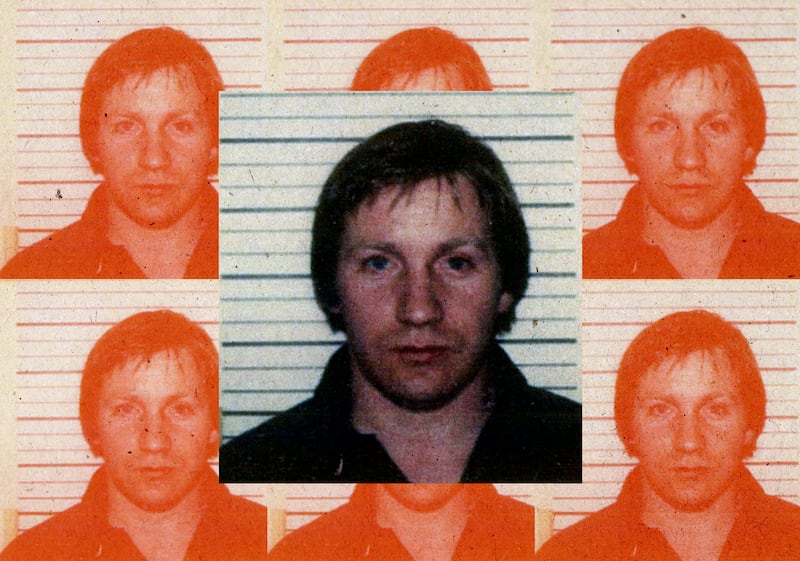
In the 1960s, Spillane was the Westies kingpin, and he had a strict agenda: make sure that Italian mobsters—who dominated organized crime in the rest of the city—stayed the hell out of Hell’s Kitchen. Spillane was adamant: no Italian mobsters were permitted to take part in any of the neighborhood rackets—a mandate that was a source of great anger among the Italians.
Phil remembers the tension well: “Not allowing the Italians into Hell’s Kitchen deprived them of some of the biggest money in the city. We had the West Side waterfront, the sex trade, and big construction projects like the Javits Center and Madison Square Garden.” Phil lets out a hearty laugh when he remembers how pissed the Italians were at being cut out.
But Jimmy C. had other ideas. He went against Spillane to form an alliance with the Gambino family, who had big interests in the city’s nightclub and sex businesses. Jimmy quietly became friends with Roy DeMeo from the Gambinos. The two mobsters had one thing in common: they both wanted Spillane gone.
In 1977, it happened—Spillane was whacked, and Jimmy took over. It was rumored that DeMeo carried out the murder personally as a favor to Jimmy.
So how much did Phil know about the hit? He just gives a sly smile and changes the subject.
Of Boas and Brass Knuckles
Jimmy C.’s friendship with the Italians opened up a world of opportunity for Phil in the early 1970s, including work as a bouncer at a bunch of burlesque theaters operated by the Gambinos. Phil worked at the Broadway Burlesk near 48th Street, the Roxy Burlesk on 42nd Street and the Paradise Playhouse over by 10th Avenue.
The Psychedelic Burlesk on Eighth Avenue near 42nd street was Phil’s favorite by far. It brought back memories from 1968 when he was 14 and went to see his first live sex show there. The performance featured two guys named Jimmy and Ray—whom Phil describes as “queer as fuckin’ three-dollar bills” —having sex with a woman who went by the name Charlotte Chantel. “Real pioneers,” Phil calls them.
When Phil went from patron to employee at the Psychedelic Burlesk, the theater was hosting one of the most popular sex shows in town. It featured a tall, skinny male performer with a long face and even longer beard. The owners put the man in a stovepipe hat, called the show ‘Abraham Lincoln’s Sex Life’, and drew lines around the block every night.
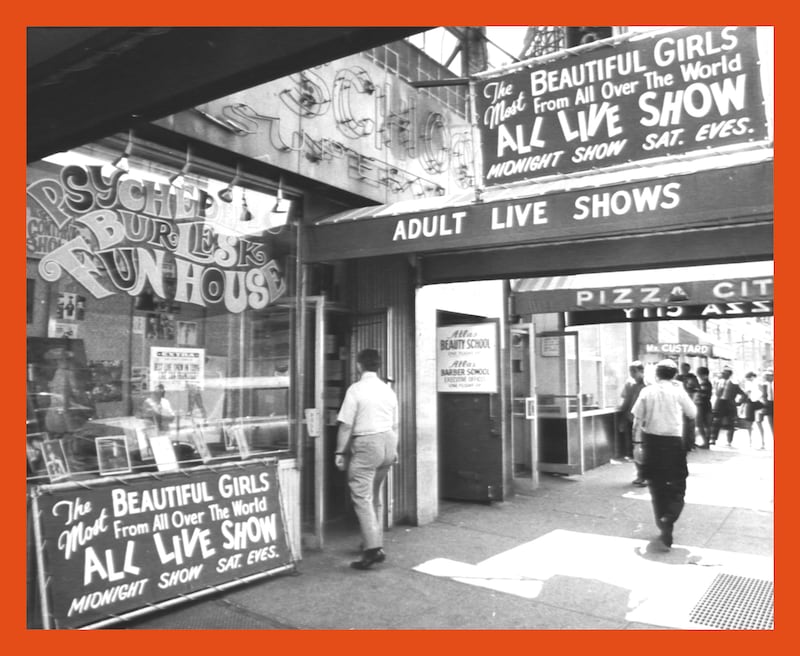
Phil’s job in this capitalist maelstrom of flesh was to provide muscle when it was needed. He would make sure nobody was bothering the cashiers. That guys weren’t climbing onto the stages. And that any troublemakers were dealt with quickly and efficiently.
Phil describes fighting as an art. You don’t want to bang somebody up inside a joint—that’s just bad for business. So you learn different skills to take a guy down without much fuss. You get hold of him by the belt, pick him up off his feet, and if he fights back... just ram him hard into a wall. He won’t cause any problems after that.
You had to have the physical presence to carry off the role of the tough and Phil did. He was 6 foot 1 and 200 pounds. He had a daily regimen of push-ups, sit-ups and dips that kept him bulked up. He knew he was going to get into fights so he just prepared for them as best he could.
And trouble was always around the corner. Phil remembers coming out of the Blarney Stone on 47th Street by Eighth Avenue back in 1970 and seeing someone shoot a guy he knew named Carl—right in the head. What the shooter didn’t realize was that Carl was protected property. No one should have touched him.
The next day, the Italians grabbed the killer and threw him off the roof of a midtown hotel, right into Times Square. Phil was there to witness the revenge and even he found it shocking. It was nothing like he’d seen in the movies. “The guy made a scrunching sound as he landed—his teeth came flying out of his mouth, and his eyeballs popped out. That shit was disturbing.”
By the time Phil turned 20 in 1973, he was an established presence in Hell’s Kitchen. He was still young, but he was well-known and had earned respect. His reputation was all the more important now that the first hardcore porn films were starting to show in Times Square theaters, escalating neighborhood troubles to new heights.
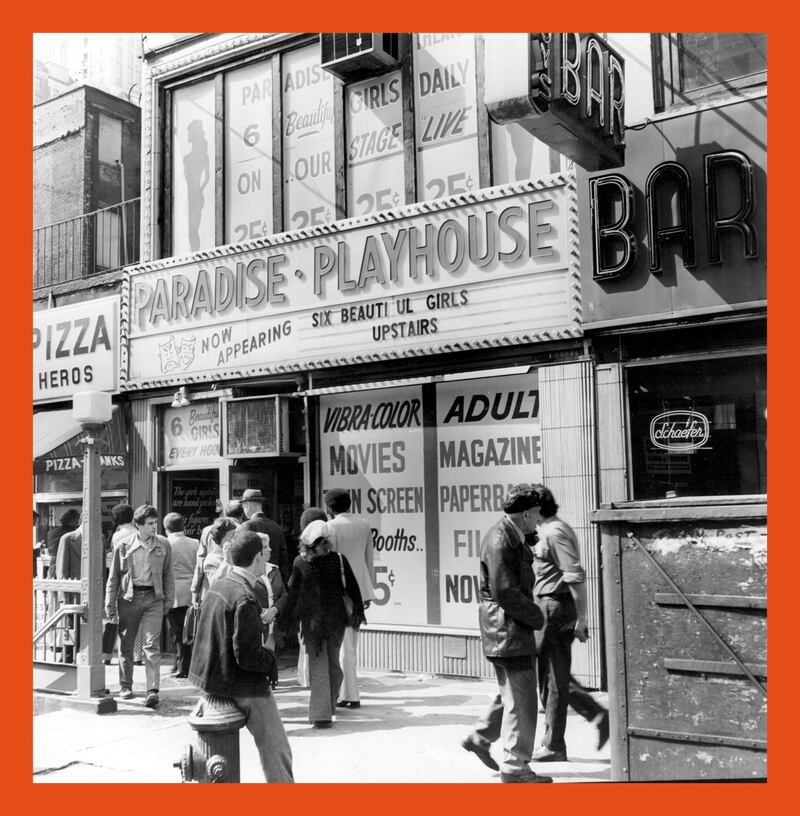
Phil readily admits he looked for a hustle in every situation in order to make money for himself. He saw how popular the new adult films were and knew that the people managing the theaters showing them weren’t the sharpest knives in the drawer. So Phil decided to be “enterprising” as he calls it and rob some of the film prints, hoping to sell them to theater owners for a pretty profit.
The first buyers he thought of were the Italians. They owned a bunch of theaters so wouldn’t they be happy to get a discount on the fuel that runs the cinemas?
Phil reached out to Robert DiBernardo, porn boss of the Gambino family, known on the streets as DiBi. Phil walked into the meeting a little cocky, confident that he was going to cement his relationship with DiBi by offering him a great deal. DiBi’s response? “These films are already ours, you fucking moron! You stole them from us.”
It could have turned nasty but DiBi and his crew got a kick out of the situation. They saw Phil as a 20-year-old kid with some pretty big balls— they liked his style and found him funny. So they took back their goods and let him go with a hearty slap on the back.
Live and learn.
Outside of the occasional slip-up, Phil was doing pretty well for a high-school dropout barely out of his teens. He was living at the Chelsea Hotel, courtesy of the owner for whom Phil handled shadier business tasks. He had income from taking care of the theaters. And he had any number of scams that earned him extra cash on the side, hustles that included theft, moving stolen goods, and shaking down anyone the bosses asked him to.
Phil wasn’t short of female companionship either. But one day at the Psychedelic Burlesk, love struck Phil like a punch to the gut.
Puerto Rico, You Lovely Island
Sometimes, Teresa Menendez would look around the dressing room of the Times Square club where she performed and wonder just how she got there. She loved burlesque, especially the costumes and the camaraderie of the girls, but it was a far cry from Cabo Rojo, the small town in Puerto Rico where she grew up.
Teresa had been a carefree child who loved school and spending time at the local beaches with friends. And Cabo Rojo was a little slice of heaven, a small colonial town with some of the most beautiful nature surrounding it. When Teresa met a boy from a nearby town and fell in love, she felt like she had it all. The courtship was intense and before Teresa knew it, she was married and pregnant.
But a romance that started hopeful and bright quickly began to show cracks. It started with sharp words Teresa’s husband hurled at her whenever he saw her talking to another man. Or when the house wasn’t perfectly clean, even though one child had quickly turned to two, then three, then four.
When the harsh words escalated to physical violence, Teresa knew she had to get out. And she believed that if she stayed in Puerto Rico, her husband would continue to be a menace. So as much as it pained her, Teresa left her children behind with her mother and headed to New York City where her sister had moved a few years earlier.
Having gone straight from high school to marriage and family, Teresa didn’t have professional experience of any kind. Her lack of work history combined with her looks and a love of dancing led Teresa to the world of burlesque. She took to it like a natural, putting her heart into making lavish costumes and choreographing elaborate routines.
It didn’t take long for Teresa to rise from opener to featured act, attracting large crowds at various clubs around the city. It also didn’t take long for Teresa to notice a shift happening in the burlesque scene she had only recently joined. The pasties and G-strings that had been commonplace were beginning to be replaced by... nothing.
The art of burlesque was turning into salacious stripping overnight, and as much as Teresa’s fans appreciated her act, they were losing patience with her modesty.
Love Teems and Teams
Phil clearly remembers the first time he saw Teresa perform: “She had great costumes, with awesome big pink feathers. She was classy—she still covered her private parts, even though all the rest of the dancers were nude at that time. And she was just so beautiful.”
After her performance, Phil made his way over and introduced himself. Teresa was skeptical at first, but was soon won over by his charm—especially the warm belly laughs he emitted at his own jokes. They wound up talking the rest of the night before heading back to Phil’s apartment where, as Phil tells it, Teresa made the first move: “She seduced me—though I admit, I was a willing victim. It was love at first sight. Or lust. Or something. She was mysterious and exotic, and I’d never met anyone like her before.”
Phil and Teresa had a whirlwind affair. They moved in together within weeks, taking a fifth-floor apartment on West 47th St. Being a good Catholic boy, Phil’s thoughts immediately turned to marriage: “We’d fallen in love, so naturally I wanted to get married. It was the right thing to do. We had our wedding in a church right down the block. My Irish family didn’t come because she was Puerto Rican. There was no way they were coming anywhere near that. They were racist. I’m not.”
As Phil and Teresa settled into married life, they discussed what they’d do for work, especially as the burlesque scene seemed to be dying, replaced by more sexually explicit fare. Live sex shows had become more popular—and more lucrative. So Phil suggested they become a ‘love team’—the term for a couple active on the sex show circuit—and Teresa agreed.
While Teresa had experience performing in front of a crowd, Phil did not. But asked if he had any fears about having sex in front of an audience, he snorts with derision: “Hell, no. Most guys can’t make their cannon perform in front of other people, but I knew I could do it. I didn’t give a fuck. I was doing it for free with Teresa anyway. So now they’ll pay me for it?!”
Phil and Teresa did well in their newfound profession, out-performing and out-earning the competition. Almost 300 people came to see them each show, and Phil remembers things often got rowdy: “People would scream at us, and in particular urge me to fail. I didn’t care. But if they really were annoying me, I’d turn towards them and bust a load into the fucking audience. You know that’s not a lie!” Phil cackles with glee at the memory.
Each performance lasted 20 minutes, and Phil and Teresa did six or seven shows a night. Phil prided himself on the fact that he would really ‘finish’ in each show and claims he often made love to Teresa again when they got home. Phil credits his age for his prowess—and the fact that, as he says, “Latinas are hot.”
While Phil and Teresa worked throughout the city, they performed most frequently at two theaters—the Avon 7 and the Avon Love. Named after the door-to-door cosmetics company to belie their sordid activity, the Avon theaters were owned by Murray Offen, an older Jewish man with a right-hand manager named Stella Stevens.
Murray and Stella both took a shine to their young Irish star and his wife. Like Teresa, they were both charmed by Phil’s charisma and humor. Phil soon found himself spending a lot of time around the Avon offices, equally amused by the middle-aged Jewish duo.
It may not have been a traditional friendship, but it was a commercial meeting of the minds.
When Love Stars Burn Out
After almost two years of constantly performing on the live sex show circuit, Phil and Teresa were worn out. While Murray and Stella hated to lose their star attractions, they understood and began to find Phil other work around their various theaters.
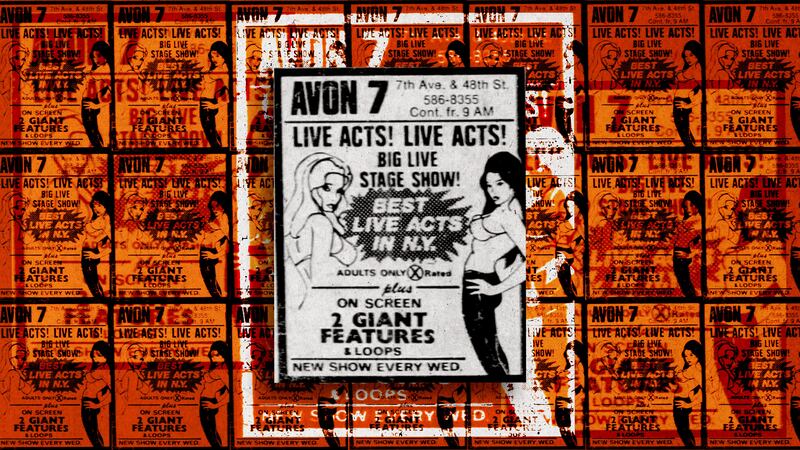
Phil liked working the theaters, but the pay paled in comparison to what he and Teresa had earned as a love team. While they still did the occasional live show, Phil needed to find other ways to make money.
Reviewing his options, Phil decided to start dealing cocaine: “I knew guys in the Colombian gang who had the New York market sewn up, so one day I approached them. Me and Marie Cortez, a friend of Teresa, we became partners. We bought from the Colombians, and sold the drugs out of my place on West 47th Street.”
The cash quickly started rolling in and Phil and Teresa were riding high. They had money, they had friends and—even after two years of live sex shows almost every night—they still had a lot of passion for each other. Things were good.
Until the night Phil came home and found Teresa and Marie Cortez murdered.
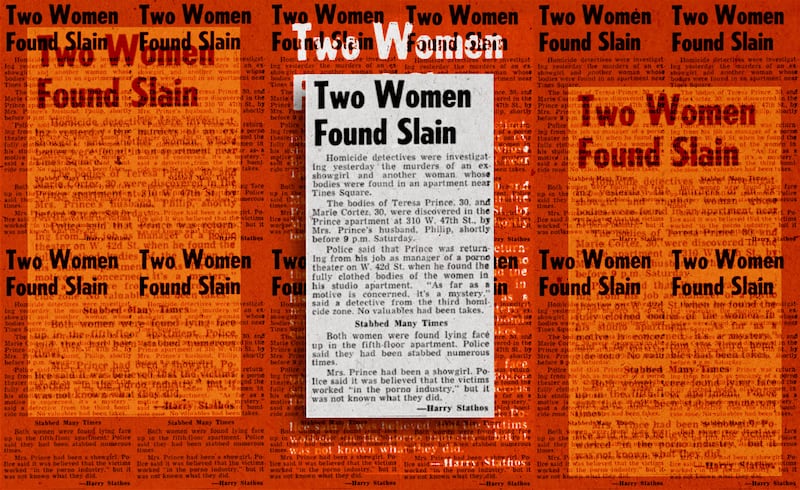
Phil goes cold when he talks about the murders. He found the two women fully clothed, both stabbed multiple times. He could tell even before he checked for their pulses that they were dead. Phil immediately dialed 911 and waited for the police and medics to arrive.
When the medics examined the two victims, Phil received another surprise—Teresa was two months pregnant. When her period was late a few weeks back, Phil felt a swell of excitement at the prospect of building out the family unit he felt he’d been robbed of as a kid. But Teresa quickly disavowed him of the notion, saying that after having had four children, she would know if she was pregnant. It was a heartbreaking way for Phil to learn Teresa was wrong.
The police said it seemed clear the women knew their assailant and let him in willingly as there were no signs of forced entry and nothing was taken. This, combined with the fact that Phil found the bodies, made him a prime suspect in the law’s eyes.
“I immediately had to get a lawyer” Phil recalls. “A couple of days later, the cops realized Teresa and I were involved in the porno business, so they tried to tie the murders to that. It was fucked up. I was grieving—and I had to deal with this shit.”
The press jumped on the pornography angle like moths to a flame. They sent reporters down to the streets of Times Square to find anyone with a quotable take on the story.

Despite Phil’s still righteous ire, he remembers the aftermath with wry, sardonic resignation: “You know what still really gets me about it? What really fucking gets me? The cops knew who did it. But they couldn’t touch the guy because he was protected. He was off-limits to them. So instead they wanted to nail me just so they could close the case. They didn’t care that they would take down an innocent person.”
Like the cops, Phil thought he knew who committed the murders. He blamed a Colombian mobster who went by the name Rodriguez—one of the cocaine cowboys Marie and Phil had been dealing with. Marie was a hard character, and Rodriguez evidently didn’t appreciate dealing with a strong woman. So, according to Phil, he sent a guy to whack Marie while Phil was out. Teresa had just been collateral damage.
When asked whether he ever confronted the killer, Phil explains that someone shot the guy on Ninth Avenue shortly after Teresa and Marie were murdered. He was shot through the head—killed instantly. The follow up question as to whether Phil knew who shot the man yields a wry smile and nothing more.
Burying a Wife; Burying Yourself in Work
While Phil displays little trace of sentimentality or bitterness, he admits he struggled with the loss of his wife. He blamed the Colombians, he blamed the drugs, he blamed Times Square. And he still blamed his father for sending him down a path that led to Teresa’s murder.
He moved out of the apartment where the murders occurred, renting a new place nearby. Without Teresa he stopped doing live sex shows altogether. And to numb the pain of his loss, he began dipping into his product, developing a coke habit that would last for years.
Murray and Stella took pity on Phil, offering him extra jobs around the Avon theaters to keep him occupied. He started working as a projectionist, then taking care of film prints. He soon became a night manager and was eventually given a theater of his own to look after. Phil worked hard for Murray and Stella and was taking home $400 a week to show for it.
But while Phil believed he had Murray and Stella’s trust, he felt he could only go so far with them: “Here’s the thing—I’m not a Jew. Murray, Stella, they were Jews. I was from a different box. I’m an Irish gangster and I ran with my crowd. There was only so far I was gonna’ go in their organization. They liked me, they were good to me—but at the end of the day, I wasn’t one of them.”
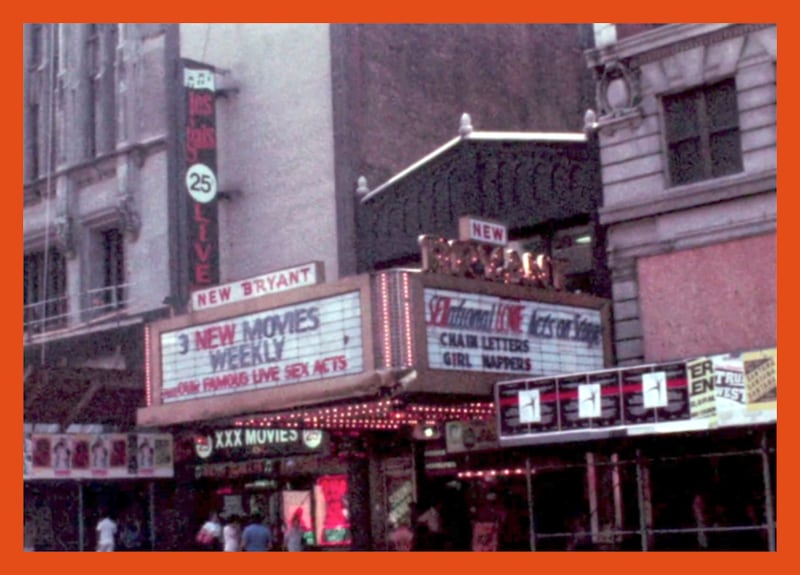
But there was one guy among the Avon Theaters that Phil bonded with—an Irishman named Pat Rogers. Phil knew Pat from his early days on the streets, and was happy when Pat turned up to work for Murray.
Pat was about 10 years Phil’s senior and looked even older thanks to prematurely grey hair—the source of Pat’s nickname, Whitey. Outside of his hair, Phil says Pat had another distinguishing feature: “He was so fucking ugly. He was the ugliest person I ever met. Amazingly he was married and had a kid—otherwise he couldn’t get laid in a whorehouse.”
While both Phil and Pat had steady work around the theaters, they still had plenty of time off. To fill that time, Phil says Pat showed him how to steal anything and everything: “Pat showed me the ropes. He was an artist, man. You didn’t know he was stealing from you. He’d leave you naked on the corner, saying, ‘What just happened to my clothes?’ He was that good. We wound up robbing the whole fucking west side. We were a two-person crime wave.”
Phil talks about going into Sears department store with Pat and taking whatever they could stuff into bags. Nylons and sweaters were lucrative hauls they’d hit up frequently. Or sometimes they’d casually pick up a floor model television each and saunter out. They’d head down to a guy in the garment district to fence the items, getting about a third of whatever the goods were worth.
One of Phil’s favorite scams was what he and Pat called cattle rustling. They’d head into local supermarkets with a rolling false-bottomed box that Pat made and fill it with the most expensive cuts of meat they could grab. Then they’d sell their stolen goods to local Italians who always appreciated a discount.
It was all easy money and, more than that, it was fun. Sure, they were stopped and even arrested once in a while but most often, they’d be let off with little more than a warning.
Because as Phil says, “I was still just a kid.”
A Gangster Grows Up
Phil was still in mourning for Teresa when his old friend Susie came back into his life. Susie was a stripper in some of the clubs where Phil first worked and they’d become fast friends—platonic, but close. Hearing about Teresa’s murder, Susie came around to comfort Phil. They started spending a lot of time together and after a few months, emotional commiseration turned to sexual consolation—which ultimately led to Phil’s second marriage.
Susie didn’t think she could get pregnant so both she and Phil were surprised when soon after they wed, they found out they were having a baby. Phil was torn, still reeling from the loss of his child with Teresa. But he longed for the family he lost as a child. And Susie was thrilled, so Phil figured ‘happy wife, happy life’—an attitude that ultimately led the couple to have three kids in all.
Even though he was now married with children, it was unrealistic to think family life would radically change Phil’s ways. Outside of the home, things continued much as they had. When Phil wasn’t working at the Avon theaters, he was out robbing with Pat or doing favors for Westies friends like Jimmy C.
While just a few years earlier Phil had worked without a gun, times had changed. The violence of the ’70s had escalated—fueled by the Spillane war and the cocaine cowboys—and now only a fool in the life would be caught without a piece.
Phil is quick to point out that he tried his best not to use the guns he carried. He believed that violence was bad for business and that anyone who used it indiscriminately was an idiot. Phil would only flash his gun when he felt someone was going to try and kill him—something that happened on occasion.
As the violence intensified, Phil continued to straddle the Irish and Italian mobs. He remained acquaintances with many of the Italians he met at the burlesque clubs but tended to keep them at arm’s length. When asked why, Phil says he always found the Italians a little crazy.
By example Phil shares a story of going to an Italian restaurant to visit Tony, a mafia member. Tony asked Phil if he wanted a beer and when Phil replied yes, Tony told him to grab one from the freezer. When Phil pulled opened the door, he was greeted by a pair of disembodied hands. Tony fell into peals of laughter, asking Phil if he ‘needed a hand’ getting his drink.
When Tony regained his composure, he explained to Phil that he needed proof of a hit he recently made. It was also the habit of the mob to bring the hands of those they killed to crime scenes so that they could leave fingerprints of the dead men.
While Phil could be put off by their methods, working with the Italians was often necessary. Phil tells another tale of a sit-down with the Irish and Italians in the early 1980s. They came together to discuss then-U.S. Attorney for the Southern District of New York, Rudy Giuliani.
Since starting in his position, Giuliani had gone hard after organized crime. Some tracked his passion back to Giuliani’s father, who blamed the Mafia for giving Italians a bad name. Whatever its origins, Rudy began his pursuit in earnest in his previous role as associate attorney general in the Reagan administration. As associate AG, Giuliani had turned the government’s legal focus away from white-collar crime to drugs and felonies.
Giuliani’s move to New York’s famed Southern District came at the perfect time to realize his legal vision. The FBI had been pursuing a massive campaign against the Mafia for over 20 years and had finally amassed the evidence to issue indictments for the mob’s key players. Giuliani had the drive and media savvy to pull those charges over the line.
His work was putting both the Italian and Irish mobs at significant risk and costing both clans serious money. So the question on the table at the sit-down Phil attended? Whether to whack their common enemy.
It was a vote among thieves and Phil remembers the discussion as heated. There was consensus among the Westies that Giuliani should be killed but the Italians were torn. While they wanted to see their enemy gone, they believed a hit would make it impossible for their organization to continue its robust business.
After hours of discussion, the plan to eliminate Giuliani was nixed. It was a decision the Italians would come to regret a couple of years later when Giuliani led the Mafia Commission Trial. Designated the “case of cases” by Time magazine, the trial led to the permanent imprisonment of several of the Mafia’s top leaders on wide-scale racketeering charges.
The Creative Blossoming of a Street Thug
As the violence in New York expanded, so did the sex. What couples like Phil and Teresa used to do on a small stage for a limited audience was now splashed across the silver screen in theaters throughout the city.
The Avon chain was no exception. Murray Offen had been showing explicit fare since the early days but by the mid 1970s he’d turned his eye to film production. Movies were a dishonest business, with distributors always trying to rip off buyers like Murray. Why should he pay top price for other people’s product when he could make his own?
Also, Murray felt he knew what audiences wanted and he wasn’t getting it from what was being offered by existing filmmakers. When he observed viewers from the back of a theater, or tallied up the box office at the end of a day, Murray saw that the dirtier the flick, the more profitable it was.
Murray first turned to a local director. But after a couple of years making films together, Murray found out that the director was stealing prints. Murray called him in for a sit-down and had Phil on hand to act as muscle.
Murray calmly explained that he needed to pay back all the money he’d made off the Avon films and that if he ever tried anything like what he did again, Murray would have him killed—simple as that.
Murray recouped his profits but lost his main director. He asked Phil what he thought they should do and, without thinking, Phil responded that he could direct the films. To this day Phil doesn’t know why he made the offer. He had no clue how films were made, and it wasn’t like he’d been pining for a creative outlet. But as had always been the case in life, when Phil saw an opportunity, he grabbed it. He told Murray he’d be able to bring in a film for less than the $20k Murray currently was paying. To Phil’s surprise, Murray let him give it a go.
Murray provided Phil with some rough guidelines: Start the film off with some whipping and beating, then move into some real ‘degenerate shit’—like rape or golden showers or some fisting. Phil had his marching orders, now he just needed his army.
Phil first turned to a cameraman named Sal Sodano. Sal had been making sex films since the early 1960s. He never used his own name, but he’d worked on everything and was the real deal. Phil credits Sal with teaching him how to direct. Sal broke down the process piece by piece, guiding Phil on how to tell a story visually and ‘make a film move’.
In terms of performers, Phil reached out to the stars he’d seen on-screen when he was a projectionist at the Avon theaters. And as for a script—if you’d call it that—the night before he was set to shoot Phil scribbled the story of an unruly school girl on the back of a napkin.
The entire film was shot in two days and took three weeks to go from concept to finished product. With the negative print and a first run of 2,000 video tapes, expenses came to $18,000. It was more work than Phil expected, but it paid off. Within about eight weeks, the film made Murray almost $100k. The profit made Murray happy, so he offered to continue the arrangement.

Becoming Avon’s resident director didn’t change Phil’s main job description. He was still general manager of Avon’s eight theaters as well as a soldier for the Westies and a part-time thief with Pat. The films were just something he did on the weekends.
While he had a good thing going with Murray, it didn’t mean Phil could trust him; more than once he’d hear from a friend that one of his films was doing great box office—but the money Phil was receiving from Murray told another story. When that happened, Phil had to “remind” Murray of the money he was owed.
But the films become more than a money-maker for Phil. They were like a game to see how much he could push the envelope and get away with. “Murray gave us the money, and encouraged us to be crazier every time, so there was no limit to what we did. We sat around and thought up the most depraved, twisted ideas. I wanted to make the most fucked-up shit anyone had ever put on screen.”
For his efforts at perversion, Phil received praise from Murray, audiences, and the media that supported the adult film business. One publication even crowned Phil ‘The Prince of Porn’—and Phil lapped up the attention. “People started recognizing my name and looking for my films... I was suddenly a star.”
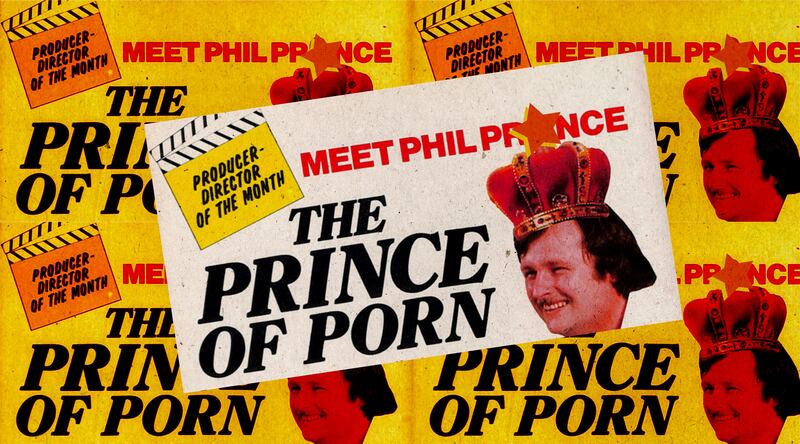
Sometimes the off-screen drama came close to matching the plots of Phil’s movies. One of his films was financed by an NYPD cop—though that wasn’t immediately clear. The agreement granted the Avon theaters first run of the feature but after the movie was made, the financier walked away with the negatives and prints.
Murray somehow convinced the producer to come in and discuss the situation. As usual, Phil was in the room, this time acting as both muscle and director. As Murray pressed on what happened, the producer revealed that he was a cop and pulled out his gun to put a point on it. Phil’s immediate thought was to shoot the guy and send his head back to his partner as a message. But Murray urged calm and somehow the three men came to an arrangement.
Phil continued to make movies for Murray for a number a of years, but in 1983 he shot his last two films. When asked why he stopped when his work continued to grow in popularity year after year, Phil says it was because of Murray. Phil wanted Murray to close down the theaters and move exclusively to video production where the money was, but says Murray was set in his ways.
“The theaters were being busted by the cops all the time at this point,” explains Phil. “We were getting run out of town by Rudy Giuliani. I told Murray, ‘You’ve gotta shit-can the fucking theaters. Switch the shit to videos and take fucking off.’ But he was an old man. His whole life was theaters, and he couldn’t see a future without them. So we decided to part ways.”

It was the end of an era. Phil had grown up with Murray, who’d become a father figure in place of the dad Phil had lost. Murray had helped Phil through the death of Teresa and had given Phil the opportunity to do what he wanted. At least up until now.
There’s a grisly post-script to Phil’s directorial career. In 1988, Phil and Murray received unwanted attention during the investigation into the ‘Route 40 serial killer’, Steven Pennell.
Pennell was arrested on suspicion of the murder and torture of three women. In a surprising alibi defense, Pennell testified that on one of the nights in question, he was watching a video of Phil’s first film, The Taming of Rebecca. Pennell’s torture of the women seemed to mimic scenes of breast mutilation in the film—disfigurement that was faked using the actress’ recently pierced nipples.
Ultimately it turned out that the killer had bought the tape months after the murders were committed. Asked about the unwanted attention, Phil answers, “Story of my life. I’m no angel. And if you swim with sharks, you’re gonna’ get bitten...”
And anyway, Phil had other things on his mind when the story came out. Like being in jail for attempted murder and armed robbery.
The Ice Cream Man Cometh
After years living in a world colored by violence, Phil acted on instinct.
He could have shot the guy in the head, but he didn’t. He just wanted the downtown Manhattan ice cream store owner to take his hands off Pat, Phil’s closest friend and partner in crime. So he aimed for the shoulder.
Phil and Pat weren’t even there for the owner. They’d come to collect from a Colombian guy named Angel who worked at the parlor—and owed Phil for a key of coke. Phil knew he shouldn’t have fronted Angel the drugs. When he did he was breaking one of the three rules he lived by: say what you mean, be loyal to your friends, and—no matter what—get paid in advance. But Angel had come with a sob story about needing money for his family. He said he already had buyers lined up so the turnaround would be fast. Plus he was referred by a mutual friend—and connections meant everything on the streets.
But then Angel stopped coming around. And anytime Phil went to see him, he’d conveniently just left for the store. Or to pick up his sister. Or to get to his job. So on the evening of June 6, 1984, Phil and his friend Pat decided to pay Angel a visit at the Greenwich Village ice cream shop where he worked.
Angel was in his Haagen-Dazs cap standing behind the counter when Phil and Pat entered the brightly lit, uncomfortably cold shop. When Phil ‘suggested’ Angel pay the money he owed, Angel told Phil to go fuck himself.
Wrong answer. Phil took out his gun and made it clear that it wasn’t so much a request as a command—Phil wanted the money Angel owed him, and he wanted it now. Gun in hand, Phil opened the cash register to see what he could collect.
That’s when the owner walked in and lunged towards Pat. And that’s when Phil aimed his gun and shot.
Did Phil go to the ice cream shop that night thinking he was going to hurt Angel? He still believed in only the most economical use of violence. And Angel was little more than a low-level thug, a nobody in the hierarchy of dealing. But Phil still blamed the Colombians for Teresa’s death. It seemed like the pain was always just under the surface, waiting to be released.
One thing’s for sure, nobody was going to take advantage of Phil. And nobody was going to lay a hand on Pat, the street-life friend Phil loved like a brother.
If the store owner just hadn’t come out. Just hadn’t chased after Phil and Pat when they were leaving the shop. Just hadn’t tried to grab Pat.
But he did.
After shooting the owner in the shoulder, Phil ran out of the store and into the middle of the street where he forced a yellow cab to stop. When he and Pat pushed into the backseat a man already inside protested. Phil pistol-whipped the passenger right out of the taxi, then pointed his gun at the driver and shouted “Drive!”
Rather than follow Phil’s order, the driver jumped out of the cab and took off running. Since he didn’t bother to put the brakes on before he fled, the cab began slowly rolling down the street.
Phil yelled at Pat to “get behind the fucking wheel”, and they set off. Phil directed Pat where to go and when to turn, like a gangster GPS. As they hit 14th Street, Phil and Pat found themselves behind a New York City police cruiser. Phil told Pat to stay behind it and drive slow so as not to raise any suspicion. When the cop car signaled left Phil was ready to let out a sigh of relief—but then Pat turned to follow the car.
Phil screamed at Pat, “Why the fuck did you do that, you fuckin’ idiot?!” Pat said “You told me to stay behind it!”
To which Phil replied, “I said stay behind the cop car—but that doesn’t mean follow it all the way to the goddamn station!”
But it was too late. The cops had just received a description of two perps in a yellow cab who had held up a Haagen-Dazs shop a few minutes ago.
Both men were arrested on the spot and Phil was immediately sent to New York’s notorious Riker’s Island. Riker’s staff processed thousands of new admissions every day and Phil joined the masses. Like the majority of inmates, Phil was held at Riker’s pre-trial and had to wait a full eight months until his case was called. He was up for felony robbery and attempted first degree murder; if found guilty, he was looking at life in prison.
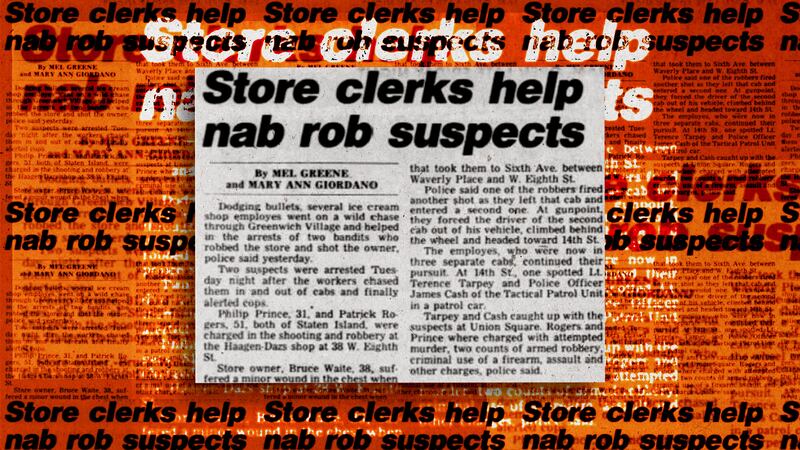
Phil turned down the state’s offer of a public defender and instead hired prominent criminal defense attorney Mel Sachs. Mel would go on to represent celebrities like Mike Tyson, Russell Simmons, and Derek Jeter and was the inspiration for Sean Penn’s performance of criminal lawyer David Kleinfeld in the 1993 film Carlito’s Way. But in 1984 Mel was focused on representing defendant Philip J. Prince.
Straightaway, Phil had conflict with his lawyer. Mel wanted to take Phil’s case to trial, but Phil thought that was a terrible idea based on the number of eyewitnesses to the crime. Mel was confident he could discredit most if not all of those witnesses, and that they should take the risk. But Phil didn’t like the sound of that at all. He told Mel he wasn’t ready to throw the dice and fired him.
In Mel’s place Phil hired Jim Bernard, a plea bargain lawyer. Whenever an Avon theater was busted Jim handled the cases and also represented local drug dealers when they were nabbed. On Phil’s behalf, Jim negotiated with the prosecutor’s office and got an offer of 15 years. Jim said it was the best deal Phil was going to get, so Phil took it.
Three days after being sentenced at the beginning of 1985, Phil started his stay at Downstate Correctional Facility, a maximum-security prison in upstate New York. Phil says it was every man for himself on the inside. “You just have to look after yourself. Nobody else matters. Nobody. You’ll get yourself killed unless you act for yourself. You’ve got to understand the joint to understand that.”
When asked how his sentence impacted wife Susie and their kids, Phil sighs. Susie was tough so Phil felt she could handle his time, but he worried for his children. He knew all too well what it was like to grow up without a father. With Phil in for up to 15 years, the agreement was Susie would do what she needed to survive.
Phil did everything he could to make sure Susie was set before he started his sentence. He went to Murray and made him an offer. “I told Murray that he was either going to buy me out of the films or I was going to put a bullet in his fucking head.” Murray eventually paid Phil a lump sum of $50,000.
Apart from the monthly visit from family, nobody came to see Phil, and he kept his head down. His good behavior paid off because after about four and a half years he was put up for parole. Phil worried he wouldn’t get it because he still had about 12 outstanding federal warrants for things he did with Pat and the Westies. But Phil got lucky. “I thought the shit would come back to haunt me, but it didn’t. Somehow, I only wound up doing a nickel on a 15-year sentence. I guess that’s what staying out of trouble gets you.”
Phil was released on December 12, 1988.
When a Hoodlum Goes Straight(ish)
Phil left prison with three things on his mind: Making money. Getting his wife and family back. And drinking a beer with his old friend, Pat.
Money wasn’t a problem: Phil still had friends with connections, and they helped him land a union job driving a truck. It was a good salary with full benefits—and it was the first time Phil had a straight gig in his life.
Next stop was Susie. Expecting Phil to be incarcerated for 15 years, she had taken up with an insurance salesman—short, bald, and doughy. But Phil showed up in great shape from daily prison workouts. What’s more, he had a solid job now too. Susie took notice, and they got back together.
As for Pat Rogers, Phil’s Irish compadre and brother-in-crime, the two took up where they’d left off. It was just like old times; they drank, swapped stories, and remembered the golden days. But just a few short years after they reunited, Pat was diagnosed with an aggressive form of cancer and he died within months.
Phil tears up as he describes it: “I lost a brother when Pat passed. He used to tell me, ‘Man, you know I was in the military, right?’ I’d just laugh, and say, ‘Pat, fuck you! The only military you were ever in was in your mind.’ But sure enough, when he died, I found out that he’d been telling the truth all along. I went to his funeral and they buried him with honors. They blew taps. Damn man, it was sad.”
Pat’s death hit Phil hard, but at least he still had Susie, the kids and a steady job. At least until the accident.
Phil was driving a pressurized tank across the country, often transporting fuel or hazardous chemicals. Each night the pressure needed to be re-set to ensure vehicle safety. It was a task that Phil took seriously.
But in the late 1990s, the driver the night before him didn’t pay the same attention to detail. Phil started his shift as he always did by double-checking the pressure gauge. Seeing the settings were off, he went to adjust them. One touch and the tanker exploded. He caught fire and hot metal shrapnel from the tank ripped through his body. He was rushed to the hospital for emergency surgery and treatment for first-degree burns.
It was touch and go for a while, but Phil pulled through. He wound up spending months in the hospital recovering from his injuries. He was alone with his thoughts, and that left him a lot of time to reflect on his life. Sure, he had regrets. He rued the four-plus years he lost to prison. But the crime, the sex, the films, the Westies? Phil says he loved every fuckin’ minute of it.
He did re-appraise some things though. For the longest time, Phil had been furious with his father for his neglect. But now as he lay in the hospital, he saw parallels in their lives. He could see that when his mother died, it’d devastated his father. His old man had no idea what to do or how to survive, so he’d shut down emotionally. Phil had just been an unintended casualty.
When Teresa was killed, Phil had gone through the same thing, struggling just to put one foot in front of the other. The more he thought about it, the more he found himself understanding his father. And with understanding finally came forgiveness of sorts.
After leaving the hospital, Phil spent his final working years making pizza for a friend with an Italian restaurant upstate. After the parlor closed in 2010, Phil lived off his social security. He spent his time caring for Susie, whose health was failing. A year after Phil retired, Susie passed away. With the kids grown up and with children of their own, Phil was alone again.
When asked what it’s like to essentially be on his own, Phil brushes away the question. “I’m comfortable with myself. You have to be if you’ve done any time and are put away by yourself for years.” He watches the ball games. He reads voraciously, with a bias for the classics. He also scours reviews of young adult novels so he can recommend books to his grandchildren.
Those grandkids visit him every few months. When they do, Phil brings them to the local diner. The last time they were there, the cashier smiled and said they looked like the model American family.
Phil laughed to himself, thinking if the people in this diner only knew the truth. Taken by the thought, he said to the young man behind the register, “You know that I used to be a mobster when I was young? And I made crazy porn films?”
The cashier looked at him a minute, then burst out laughing at the suggestion. Phil joined him with one of his deep belly laughs, and told the guy he was just messing with him.
Picking up the change, Phil turned and slowly made his way back to his family.

Postscript of an Outlaw
On Sept. 11, 2018, Philip Joseph Prince passed away at the age of 65. A brief obituary referenced his intelligence, humor and family. It is a heartfelt, genuine piece though, perhaps understandably, it overlooks most of Phil’s colorful past.
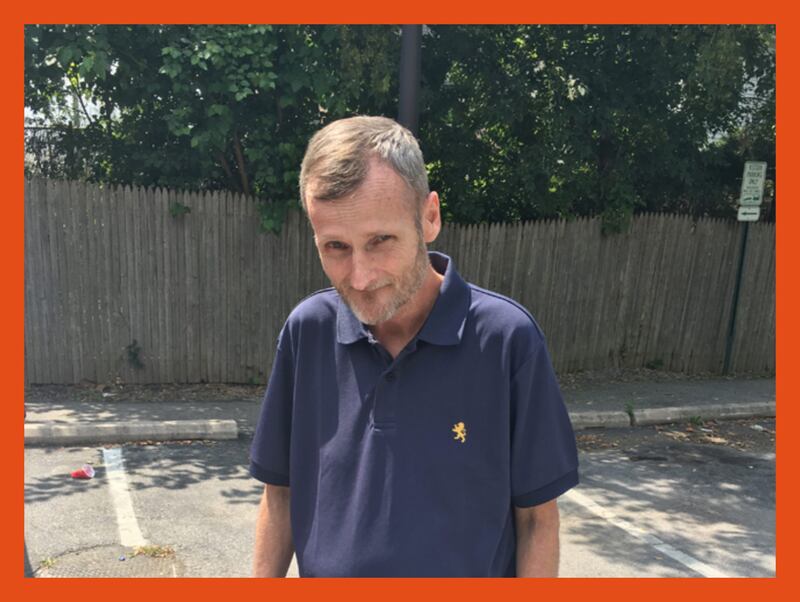
Ashley West and April Hall are the founders of TheRialtoReport.com, the authoritative online archive for oral history, audio recordings and photographs documenting the Golden Age of Adult Film.


